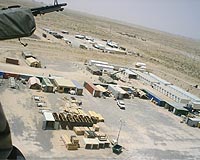| . |  |
. |
Ramadi, Iraq (AFP) Jan 7, 2010 Co-ordinated bombings targeting a local anti-terror chief and his family shattered four homes early Thursday morning in the western Iraqi town of Heet, killing seven people. Lieutenant Colonel Walid al-Heeti was initially thought to be among those who died in the blasts, which hit the town, 60 kilometres (35 miles) west of the Anbar provincial capital Ramadi, at around 3:00 am (0000 GMT), but police later said he had survived. "His brother died, not Walid -- we thought Walid died, but he has survived," said Lieutenant Ezzadine Adil, the officer in charge of the investigation into the bombings. "His brother, his name is Saad, died. Walid's house was destroyed in the bombing. His (Walid's) mother and wife were killed. "The toll is seven killed -- his brother, four women, a baby and a policeman." Six others were wounded in the blasts. Attackers planted explosives around the bedrooms of four houses in the town, according to Lieutenant Colonel Fadhil Nimrawi, the head of Heet's emergency response unit. Nimrawi had earlier said that Walid al-Heeti had died in the blasts. The four houses were in different neighbourhoods across the centre of Heet, and no vehicles are being allowed in or out of the town as part of ramped up security. Nimrawi added that several people had been arrested in connection with the attack, but declined to specify how many, citing security reasons. He added that security forces were still looking for other people they suspected of being involved in the bombings. Heeti is one of the leaders of a campaign against Al-Qaeda in mostly Sunni Anbar which helped dramatically reduce the terror network's presence in the province, Iraq's biggest. Several cities in Anbar were used as insurgent bases in the aftermath of the US-led invasion of 2003. But since 2006, local Sunni tribes have sided with the US military and Iraqi authorities. Daily violence has dropped dramatically as Al-Qaeda fighters have been ejected from the region. Thursday's attacks were the latest in a string of bombings against targets symbolising the government or the state in recent months, indicating a shift in tactics by insurgents as the overall level of violence drops nationwide. On December 30, co-ordinated bombings near government offices in Ramadi, which were blamed on Al-Qaeda, killed 23 people and wounded the Anbar provincial governor. Earlier that month, the head of Salaheddin province's anti-terror squad and at least three of his bodyguards were among five people killed by a suicide bomber in Tikrit, the predominantly Sunni hometown of executed Iraqi dictator Saddam Hussein. Co-ordinated vehicle bombings in Baghdad in August, October and December, meanwhile, killed nearly 400 people in all.
Share This Article With Planet Earth
Related Links Iraq: The first technology war of the 21st century
 Leaving Iraq: Logistics move 'staggering'
Leaving Iraq: Logistics move 'staggering'Baghdad (UPI) Jan 5, 2009 As the "coalition of the willing" slips into history and morphs into U.S. Forces-Iraq, the military prepares for the final phase of the massive logistical operation to withdraw U.S. forces and their war machine, even the scrap, from Iraq. All combat forces are scheduled to be out of Iraq by August, leaving only a residual contingent of 50,000 instructors to train Iraqi forces, advisers ... read more |
|
| The content herein, unless otherwise known to be public domain, are Copyright 1995-2009 - SpaceDaily. AFP and UPI Wire Stories are copyright Agence France-Presse and United Press International. ESA Portal Reports are copyright European Space Agency. All NASA sourced material is public domain. Additional copyrights may apply in whole or part to other bona fide parties. Advertising does not imply endorsement,agreement or approval of any opinions, statements or information provided by SpaceDaily on any Web page published or hosted by SpaceDaily. Privacy Statement |